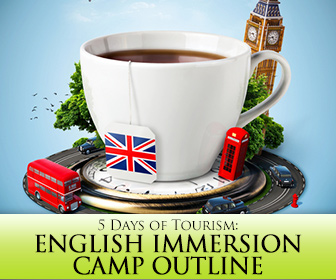
Many ESL teachers are required to run English immersion camps during school holiday periods.
Although requirements vary based on the school and the students involved, the general idea is usually to provide students with opportunities to practice using English while doing something fun and educational. Most ESL students that I have encountered have a certain fascination for their foreign teacher and their country of origin. So why not give them a window into that world? This is an outline for a five day camp based around allowing the students to learn about the teacher’s home and a bit about the teacher himself or herself. Students will create a presentation and a travel article about a given city/region in the teacher’s home country. Their goal is to make their assigned region sound the most appealing for prospective travellers. Information about the area will come from materials supplied by the teacher, internet research, and an interview with one of the teacher’s friends/family/acquaintances who has lived in that area. These interviews will be conducted over Skype.
Before we get into the details, a few notes. This is a class for high level students. They need to have a really good grasp of English in all forms, especially writing, speaking, and reading. Research is often something that students do not have a lot of experience with and almost none of them have ever done an interview before so the teacher must be sure to lay out a process for both of these endeavours. Ideally, the teacher will bring in a video clip of someone doing an interview, or, better yet, do a sample interview with a colleague in front of the class.

Pre-planning (There Is a Lot of It)
The vast majority of the work for this camp project happens well before the camp ever gets started. First, check with your school and make sure you have access to all of the technology you will need. This is a technology heavy project and without access to computers and internet the most interesting part (the interviews) is out of the question.
Scheduling interviews across multiple time zones can be extremely difficult, so that is the next thing a teacher should do. Create a list of people you know form home who have lived in different regions of your country. Contact them and see if they would be willing to be interviewed by your students about their time in a specific area. Their availability will partially dictate the schedule in the second and third days of your camp. Set the interview times well in advance allowing for the time difference and work schedules.
Decide if your students are capable of conducting satisfactory online research into the different destinations. If they are, then the teacher does not need to supply much in the way of material. If not, teachers need to prepare a material package (travel highlights, places to stay, things to do, getting there and away) information about each destination for the students to sift through. This will be a very time consuming process.
Even if the students are able to do their own research, collect several travel magazines and guidebooks to show them as examples of the type of thing you are looking for. If you chose to have students make posters of their destinations, the magazines can double as collage/poster material.
Create an introductory presentation for the camp. This should include an overview of the project, an explanation of the rewards/point system (should you choose to have one), the schedule for the week, a clear set of expectations for the presentation and articles laid out in bullet points, an introductory slide for each of the locations that will be assigned, and instructions for conducting interviews and research.

Materials
Here are a few things you will need.
- Internet connection
- Craft materials (if you decide on posters)
- Projector
- Skype enabled computer(s)
- Computer lab access
- Printer
- Sample magazine articles/travel brochures
- Sample interview questions
- Note paper and envelopes

Use This Plan for a Successful English Camp
-
1
Day 1:
Open the day with some sort of warm-up activity. Tongue twisters, human tangle exercises, anything that has the kids interacting and speaking in front of one another will work. Ideally, the teacher will have some idea of the student levels before the camp starts and have created relatively even groups. If not, the warm-up will be important in helping to gauge this and to group students effectively.
Follow this with the introductory presentation. I strongly recommend that you have some sort of point system for the entire camp. Good behaviour and winning introductory activities gain points, while bad behaviour, being late, etc. lose points. Before the final part of the presentation, divide the class into their groups. Have a short activity/game where the groups compete to determine a ranking. Go through the introductions of the different places and then the winning group chooses first and so on down through the rankings. At this point hand out any information you have on the different locales, tell the groups which of the teacher’s friends they will be interviewing and when, and give them sample travel articles that you want them to emulate.
Follow up with a presentation about how to go about internet research and how to ask good questions during an interview. How this presentation looks will largely depend on the class level and how comfortable they are around foreigners.
The remainder of the day will be given over to internet research and developing interview questions.
-
2
Day 2:
Start the day with a fun warm-up activity. Once that is complete, the students will have time to conduct more research and for the first interviewers to put finishing touches on their interview questions.
The second part of this class will go to the first set of skype interviews. Letting the other students watch is beneficial as they all get more comfortable the more interviews they see. To keep all the students interested and involved, I always left five or ten minutes at the end of each interview where any student in the class could come and ask questions about the area or about myself as the teacher (what I was like when I was young, did I get into trouble, etc). Some of the best English I have seen from my students came out when they really wanted ask one of my friends if I had ever been in trouble at school.
-
3
Day 3:
Start the day with a fun warm-up activity.
Day three is largely a repeat of day two with skype interviews and time at the end to start outlining their presentations and articles.
-
4
Day 4:
Start the day with a fun warm-up activity. From here, this day is dedicated to finalising the group travel articles and presentations. If at all possible, have a separate room where groups can go to practice their presentations if they so desire. All travel articles must be finished and handed in by the end of the day. Reading and evaluating them is the teacher’s homework. It’s also a nice idea to create a booklet of the final travel articles and give a copy to each student in the camp. Depending on your locale, many countries have cheap print shops that will create a spiral bound booklet for very reasonable prices.
-
5
Day 5:
Start the day with a fun warm-up activity.
The rest of the day is dedicated to travel presentations. Using a game to decide the group order is always great. It can be complicated or as simple as rock, paper, scissors. Anything random or that gives the students agency will minimize the complaints. In this vein, it’s always great if you can have a guest judge to decide which destination is most appealing after the presentations. Even a head teacher is great. It takes the pressure off you and makes the students really put their all into preparing and presenting their material.
Once all the presentations are complete, each group will sit down and write a thank you letter to the person they interviewed. The teacher reviews them to make sure they are acceptable and then mails them after the camp is finished. (This can be done in the morning as well, but it seems to go better once the pressure is off.)
Finally, declare the winners in each category, hand out booklets and prizes, and have your end-of-camp party.
What the students really loved about this camp was talking to other foreigners and getting ‘the dirt’ on their English teacher from his friends and relatives.
Some of them cheered each time a new face came on the screen. Having said that, they were nervous as well and the only reason it worked was because they were all high level middle school students. This camp lets the students practice English in a more natural way through the interviews and through creating their own presentations. As a result, many students gained a great deal of confidence over the course of this project.
P.S. If you enjoyed this article, please help spread it by clicking one of those sharing buttons below. And if you are interested in more, you should follow our Facebook page where we share more about creative, non-boring ways to teach English.







